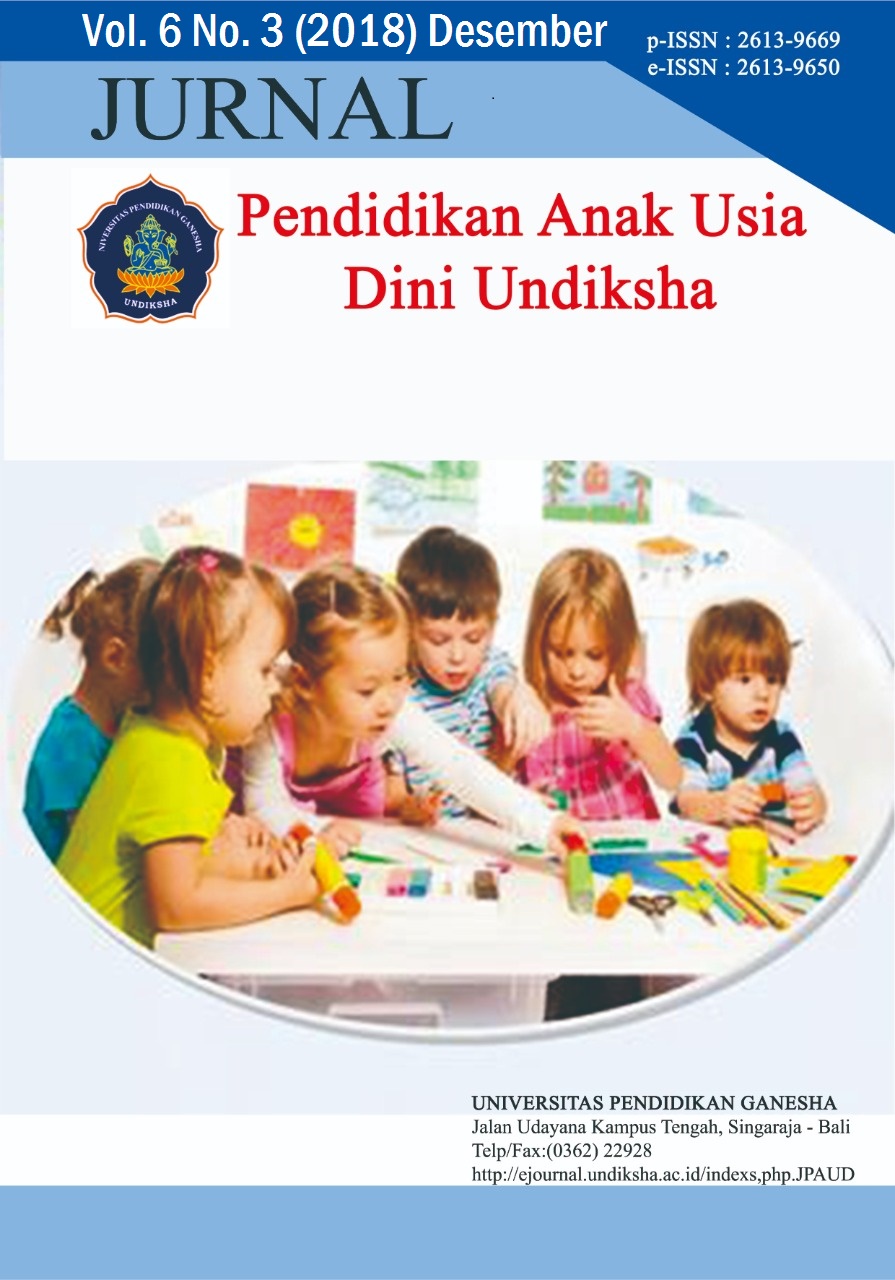PENGARUH PERMAINAN KONSTRUKTIF TERHADAP PERKEMBANGAN SOSIAL ANAK PADA KELOMPOK B GUGUS VI KECAMATAN BULELENG
DOI:
https://doi.org/10.23887/paud.v6i1.15199Abstract
Perkembangan sosial anak sangat penting untuk dikembangkan dalam melakukan hubungan sosial di lingkungan sekitarnya, tetapi pada kenyataannya perkembangan sosial anak masih rendah dengan rata-rata 42,50%. Hal ini disebabkan minimnya penggunaan permainan konstruktif yang belum efektif, sehingga kualitas proses pembelajaran kurang optimal. Penelitian ini bertujuan untuk mengetahui pengaruh permainan konstruktif terhadap perkembangan sosial anak. Jenis penelitian ini merupakan penelitian quasi eksperimen, dengan desain penelitian Non equivalent Control Group Design. Populasi dalam penelitian ini adalah seluruh anak kelompok B pada gugus VI Kecamatan Buleleng yang berjumlah 387 anak. Pengambilan sampel dengan teknik random sampling dan yang terpilih sekolah TK Negeri Pembina sebagai kelompok eksperimen serta TK Aisyiyah sebagai kelompok kontrol. Hasil penelitian menunjukkan bahwa pada kelompok eksperimen memperoleh rata-rata sebesar 32.23 sedangkan pada kelompok kontrol memperoleh sebesar 24.75. Data perkembangan sosial anak kelompok eksperimen dan kelompok kontrol berdistribusikan normal dan homogen. Kemudian data dianalisis menggunakan uji-t, maka diperoleh hasil t_hitungdari kelompok eksperimen dan kelompok kontrol memperoleh hasil sebesar 12,26 dengan taraf signifikan 5% dan derajat kebebasan dk =57 adalah 2.002, sehingga t_hitung lebih besar dari t_tabel maka H_0 ditolak dan H_1 diterima yang berarti terdapat pengaruh yang signifikan antara kelompok yang mendapatkan perlakuan permainan konstruktif dengan kelompok yang tidak mendapatkan perlakuan.Kata Kunci : perkembangan sosial, permainan konstruktif.
Social development of children is very important to be developed in social relationships in the surrounding environment. But in fact, the social development of children is still low with an average of as 42,50%. This is due to the lack of use of contructive games that have not been effective.so, the quality of learning process is less than optimal. This study aims to determine the effect of constructive game on social development of children. This type of study is a quasi experimental research, with research design Non equivalent Control Group Design. The population in this study were all children of group B in cluster VI Buleleng sub-district which amounting to 387 children. Sampling by technique cluster sampling, and selected one is Negeri Pembina kindergarten school as experimental group and Aisyiyah kindergarten as a control group. The results showed that in the experimental group earn on average 32,23 while in the control group earn on average 24,75. The children's social development data of the experimental group and the control group are normal and homogeneous distributed. Then the data were analyzed using t-test, the result obtained t_hitung of the experimental group and the control group obtained the result of 12.26 with a significant level of 5% degree of freedom = 57 t_tabel of 2.002, so t_hitung bigger than t_tabel then H_0 rejected and H_1 accepted which means there is a significant influence between groups receiving constructive game treatment with non-treated groups.
keyword : social development, constructive game.
Published
2018-07-26
How to Cite
., M. H. P., ., P. D. A. A. G. A., & ., M. M. S. M. (2018). PENGARUH PERMAINAN KONSTRUKTIF TERHADAP PERKEMBANGAN SOSIAL ANAK PADA KELOMPOK B GUGUS VI KECAMATAN BULELENG . Jurnal Pendidikan Anak Usia Dini Undiksha, 6(3), 333–343. https://doi.org/10.23887/paud.v6i1.15199
Issue
Section
Articles
License
Authors who publish with the Jurnal Pendidikan Anak Usia Dini Undiksha agree to the following terms:
- Authors retain copyright and grant the journal the right of first publication with the work simultaneously licensed under a Creative Commons Attribution License (CC BY-SA 4.0) that allows others to share the work with an acknowledgment of the work's authorship and initial publication in this journal.
- Authors are able to enter into separate, additional contractual arrangements for the non-exclusive distribution of the journal's published version of the work (e.g., post it to an institutional repository or publish it in a book), with an acknowledgment of its initial publication in this journal.
- Authors are permitted and encouraged to post their work online (e.g., in institutional repositories or on their website) prior to and during the submission process, as it can lead to productive exchanges, as well as earlier and greater citation of published work. (See The Effect of Open Access)











